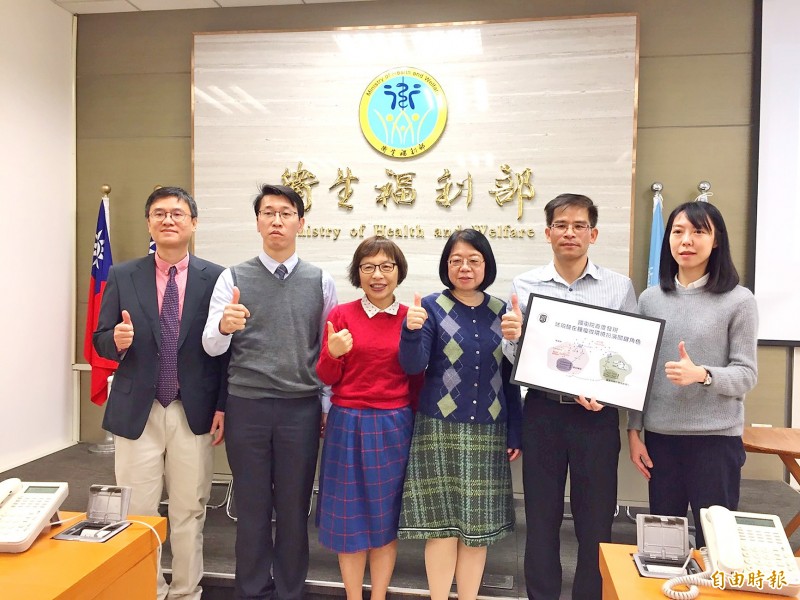《TAIPEI TIMES》 NHRI researchers make key lung cancer finding

From left, Tri-Service General Hospital physicians Hsu Yu-Juei and Huang Tsai-wang, National Health Research Institutes (NHRI) Secretary-General Wu Shiow-ing, NHRI Institute of Cellular and System Medicine director Lin Hsiu-fang and associate researcher Kuo Cheng-chin, and research team member Wu Jing-yiing give the thumbs up at a news conference at the Ministry of Health and Welfare in Taipei yesterday. Photo: Wu Liang-yi, Taipei Times
A STEP FORWARD: The team found that inhibiting the succinate levels in mice increased their survival rate and that succinate levels could be used as a biomarker
By Lee I-chia / Staff reporter
The National Health Research Institutes (NHRI) yesterday said it had discovered that succinate levels in blood serum could serve as a potential biomarker for lung cancer progression, and that inhibiting succinate levels might reduce the risk of lung cancer metastasis.
NHRI Institute of Cellular and System Medicine associate researcher Kuo Cheng-chin (郭呈欽) said that cancer has been the most common cause of death in Taiwan for many years.
Among them, non-small cell lung cancer has a relatively poor prognosis, he said.
As there is no effective screening method for non-small cell lung cancer, patients are usually diagnosed in the later stages, he added.
His research team began looking into metabolites to find ways to inhibit cancer growth and metastasis, and they discovered that the serum succinate levels in stage 1 or stage 2 non-small cell lung cancer patients were higher than in people without lung cancer, Kuo said.
Cancer cells have the ability to damage surrounding tissue and change their microenvironment, he said.
From animal experiments, the team found that cancer cells secrete succinate to activate and polarize macrophages — large white blood cells that are an important part of our immune system — turning them into tumor-associated macrophages, which promote tumor progression and metastasis, he said.
The cancer cells that secrete succinate are not limited to lung cancer, but are also found in breast cancer, colon cancer and prostate cancer, Kuo said.
Elevated serum succinate levels in patients with lung cancer could also serve as a biomarker for tumor progression and metastasis, he added.
Research team member Wu Jing-yiing (吳京穎) said they also experimented injecting a succinate monoclonal antibody into mice with non-small cell lung cancer, and found their eight-week survival rate significantly increased — all of the mice injected with the succinate monoclonal antibody survived, but about half of the mice that were not given the injection died over the next eight weeks.
Kuo said that the team would try to develop cancer test kits, as well as targeted cancer therapy.
The team’s findings were published in academic journal Molecular Cell on Thursday last week.
新聞來源:TAIPEI TIMES















